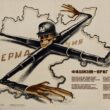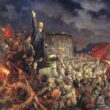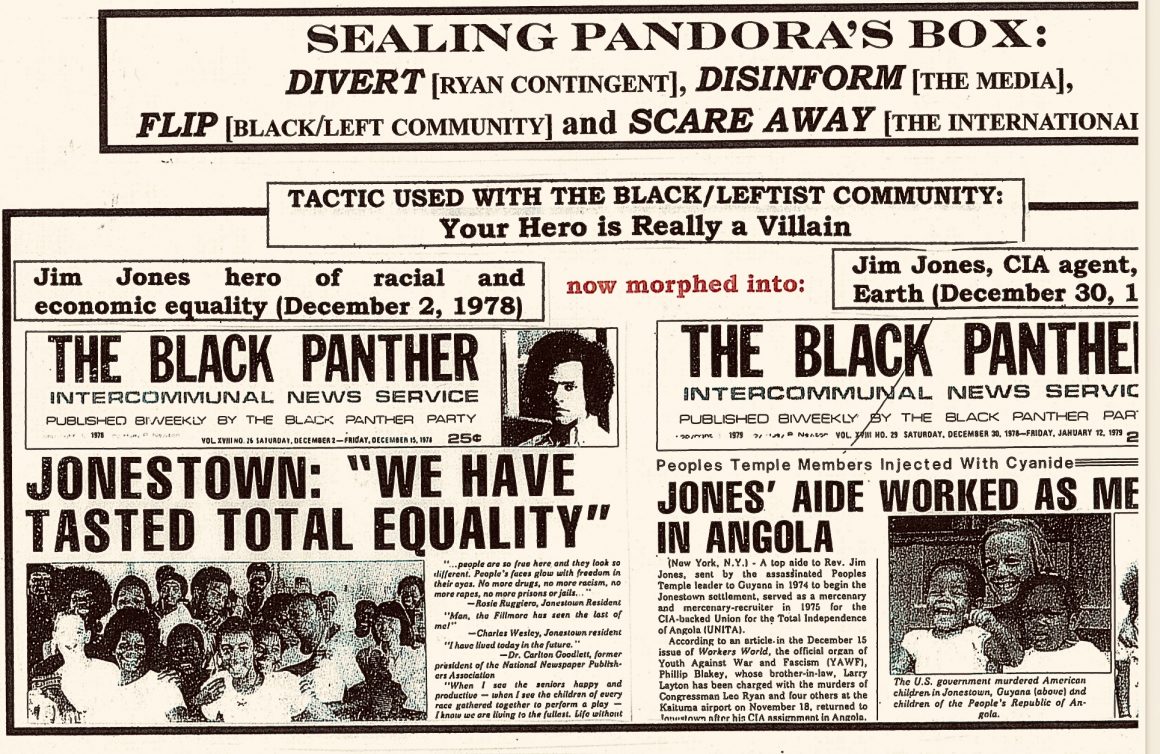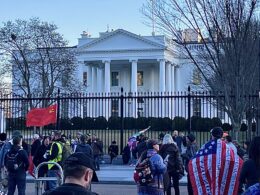In 1979, the members of the Black Panther Party published an issue of their newspaper in which they admitted that they had been duped. On one side of the front page, they displayed a headline their paper had featured in the year before that read “Jonestown: ‘we have tasted total equality,’” next to the headline which articulated the party’s new view of Jonestown: “Jones’ aide worked as mercenary in Angola.” It was underneath the part of the text that mentioned how People’s Temple members had been injected with cyanide. Above these headlines, the Panthers put a summary of the kinds of counterrevolutionary maneuvers that this incident represented: “Tactic used with the black/leftist community: your hero is really a villain.”
Above this all, the issue displayed the phrase the Panthers had come up with to summarize such wrecker manipulations: “sealing Pandora’s box,” with the strategy’s steps being to divert revolutionary energy, disinform the people, flip the potential allies of revolutionaries against them, and scare away the international liberation movement from working with the revolutionaries in the imperial center. By isolating and confusing the movement in these ways, the state’s aim was (and still is) to shut the Pandora’s box of class struggle, to keep the people from mobilizing for their liberation. This is at least how I’ve personally interpreted their metaphor.
The Panthers did not succeed at overcoming this counterinsurgency effort. They were successfully infiltrated, framed, and assassinated within the ranks of their leadership. But the lessons they provided remain. They gave future generations of communists information on what sorts of psychological weapons the enemy will employ to try to destroy revolution in the core of imperialism. To win, we must study these lessons, and recognize how to identify such deceptive tactics when we encounter them.
Infiltrating the revolution
When I look at stories of freedom fighters being infiltrated, and of this infiltration going far enough that people get hurt, I always wonder what the victims may have been able to do to avoid what happened to them. As an organizer who’s on the autism spectrum, this question is especially relevant to me, because when your social judgement is impaired you become an attractive target for predatory individuals. To help inoculate ourselves against such manipulations, we can study the types of ideas and ways of acting which are displayed by the operatives the Panthers talked about, the ones who pretend to be your heroes but are actually the villains.
In the case of the People’s Temple, this was a thousand times bigger than the interpersonal manipulation activities that COINTELPRO agents carry out within activist spaces. This was big enough to not just physically and psychologically destroy a vast amount of American radicals, but contribute in large part to the destruction of the American communist movement.
Prior to when the sinister nature of the People’s Temple became undeniable, the red flags for its being an intelligence operation were almost impossible to notice on a surface level. The fact that it was receiving the backing of many liberal celebrities and politicians was something to be wary of, but this alone wasn’t enough to make the Panthers seem suspicious during the years leading up to the massacre. To recognize what was really happening, the Panthers would have had to have known about the secret abuses within the organization, about how Jim Jones was mentored by the CIA torturer Dan Mitrione, about how the Temple was backed by prominent right-wing figures who were keeping themselves distanced from the Temple’s Marxist brand, and of course about the intelligence and mercenary roles of those who were guiding everything Jones did. For the many people within the Black community who got drawn into the Temple, its warning signs were barely visible if at all, and its charitable work and appeals to Black America’s religious culture appeared to be green flags.
The Panthers were not fools when it came to intelligence, because it’s evident that the Temple was able to hide its leadership’s CIA connections extremely effectively up until everything got exposed. But there were ideological influences within the party’s ranks that made it harder for them to see through the ruse that the spooks were perpetrating, which made for less scrutiny than would have otherwise been present. It’s these influences that would go on to cripple the party’s legacy.
This influence came from Angela Davis, the one in the party who most vocally supported the People’s Temple. Davis personally told Jones: “I know you are in a very difficult situation right now and there is a conspiracy. A very profound conspiracy designed to destroy the contributions which you have made to our struggle. And this is why I must tell you that we feel that we are under attack as well. When you are attacked, it is because of your progressive stand, and we feel that it is directly an attack against us as well. Therefore, more of us need to know that we will be carrying on this idea, that we will do everything in our power to ensure your safety and your ability to keep on struggling.”
Davis of course wasn’t the only Panther who had praised the Temple prior to the massacre, and when the party’s publication clarified that the party had changed its stance on Jim Jones, it was speaking for all of its members Davis included. But there was a certain ideological strain that had led Davis to be inclined towards allying with the Temple to such a strident degree, and this strain came from the same source that had created Jones: the CIA. I know this claim sounds like slander (and I wish it was), but Davis herself has proudly admitted to have been ideologically influenced by the CIA operative Herbert Marcuse:
In 1968, I was one of Herbert Marcuse’s graduate students at UC San Diego, and we all benefited both from his deep knowledge of European philosophical traditions and from the fearless way he manifested his solidarity with movements challenging military aggression, academic repression, and pervasive racism. Marcuse counseled us always to acknowledge the important differences between the realms of philosophy and political activism, as well as the complex relation between theory and radical social transformation. At the same time, he never failed to remind us that the most meaningful dimension of philosophy was its utopian element. “When truth cannot be realized within the established social order, it always appears to the latter as mere utopia.” As new generations of scholars and activists ponder the role of intellectuals in shaping radical movements of this era, I believe that Marcuse’s ideas can be as valuable today as they were 50 years ago.
Davis may have been forced to change her view of the People’s Temple, but the ideas that led her to be so ideologically compatible with its pseudo-Marxist brand were not given up by her. She’s even since gone so far as to promote these ideas to a new generation of people who hope to become revolutionaries. If these young people follow the path Davis is trying to set them on, they’ll meet the same kind of fate that the last generation met. This was a fate where the CIA gathered enough intelligence on the American communist movement that it could manage to fatally infiltrate and persecute the Black Panther Party; where hundreds of communists and potential communists were murdered in the Guyana compound; and where the strain that Davis led would use Marcuse’s Jonestown-adjacent ideas to take U.S. Marxism in a self-defeating direction.
To reveal what I’m referring to with that last point, I’ll need to delve into how Marcuse’s ideas guided the way Davis and the others within her school of thought responded to the fall of the Soviet bloc.
Defanging the revolution
If you’ve ever been part of an organizing space, and come across someone who you eventually deduced to have been an infiltrator, you’ve seen the kinds of ideas Marcuse represents. These ideas are visible in an intense passion for the broad notion of social change, without the theoretical understanding that’s necessary to be an actual revolutionary. When infiltrators enter a group, they adopt the rhetoric and aesthetics of the cause they claim to support, relating with the members about the cause’s ideas and instilling inspiration within the minds they seek to manipulate. Then they slip poisons into these ideas they push, such as “you need to split from your group to be a real revolutionary” or “that person isn’t truly down with the cause and needs to be treated like your enemy.” To manufacture such divisions, these agents can’t base their rhetoric around genuinely sound theory. They need to replace that theory with fraudulent theory, like what was propagated by Marcuse and the others within the intelligence-tied Frankfurt School.
When someone has this mentality of rhetoric over theory, where if someone says they oppose the current social order then they should necessarily be trusted, it’s easy to be drawn in by the kind of “Marxist” cult which the People’s Temple was. Or, more commonly, by the manipulative pitches of the smaller-scale movement wreckers who present themselves as dedicated lovers of social justice. This mentality isn’t merely the consequence of naivete. It’s also what comes from having absorbed the types of pseudo-radical ideas that CIA propaganda sources like the Frankfurt School put forth. The spooks have formulated an intellectual framework designed to lead people down this path.
As the Marxist scholar Gabriel Rockhill has concluded, these ideas contain the seeds not just for being deceived by con artists, but for getting radicalized towards fascist ideology:
Todd Cronan has argued that there was a palpable shift in the Frankfurt School’s overall political orientation around 1940—the year [Friedrick] Pollock wrote “State Capitalism”—as it increasingly turned its back on class analysis in favor of privileging race, culture and identity. “It often seems to me,” Adorno wrote to Horkheimer that year, “that everything that we used to see from the point of view of the proletariat has been concentrated today with frightful force upon the Jews.”[34] According to Cronan, Adorno and Horkheimer “opened up the possibility from within Marxism of seeing class as a matter of power, of domination, rather than economics (the Jews were not a category defined by economic exploitation). And once that possibility was raised, it became the dominant mode of analysis on the left at large.”[35] In other words, the Frankfurt theorists helped set the stage for a more general shift away from historical materialist analysis grounded in political economy toward culturalism and identity politics, which would become consolidated in the neoliberal era.
Thankfully Davis wasn’t led towards antisemitism, but there are plenty of followers of the Frankfurt philosophy who have. What the CIA has done by normalizing this ahistorical, anti-materialist analysis within the American left is steer leftists away from the ideas which make them immune to identity-obsessed narratives, including antisemitism. If you’ve been led to fundamentally reject class as the lens through which to understand society, then you’re going to get influenced by ideas which tell you to see everything through a race-based lens. This potentially includes ideas that are not just undialectical, but racist.
If someone doesn’t get led towards Nazi race science by these ideas, they’ll at the least get led away from genuine Marxism. Without a class analysis, you can get drawn in by gang fetishism (which is supporting small capital against big capital), by ethno-nationalist ideas that go against decolonial solidarity (like the Chicano chauvinist plan to roll over tribal sovereignty by giving Mexico the land back), by an adventurist fixation on the violent aspect of revolution that ignores the needs of the people (like Gonzaloism), by a race reductionist view that renders class irrelevant (like the Sakaist notion that the white working class can’t overall be radicalized), or more benignly, by the reformist tendency that Davis ultimately embraced.
When I say Davis embraced reformism, I say so with the awareness that she didn’t start off as a reformist. Initially Davis’ only traces of such revisionist ideas were to be found in her Frankfurt School involvement, and Davis could easily have come to reject them. But as the decades went by, and Washington’s anti-communist crusade kept gaining victories, Davis eventually folded. During the 1970s, Davis was refusing to give ground to the arguments of anti-communist propagandists like Alexander Solzhenitsyn, having replied to his demand for a denunciation of the Soviet bloc’s supposed maltreatment of pro-capitalist dissidents: “They deserve what they get. Let them remain in prison.” But after Jonestown, the destruction of the Panthers, and the dissolution of the Soviet Union, Davis had become willing to more fully embrace the anti-Marxist ideas that had informed her support for Jim Jones.
With the end of the Panthers, Davis became a member of the Communist Party USA. Which had long been a chauvinistic party that considered communism “20th century Americanism,” but was at least valuable enough for the USSR to decide to back it. When Washington won the Cold War, and the CPUSA lost access to its former resources, its most chauvinistic and opportunistic strains gained an opening to take the party away from Marxism-Leninism, and embrace the “anti-authoritarian” liberalism of Democratic Party appendages like the DSA. These opportunist members formed an entity called the Committee of Correspondence, facilitated with the help of Davis, which exploited the destruction of the Soviet bloc to make a case for the same kind of “human rights”-based anti-communism that Davis had so ardently rebuked two decades prior. The COC claimed that the USSR’s collapse “makes clear that the socialist ideal cannot be reconciled with authoritarian politics.”
The COC advocated for “the construction of strategic democratic alliances between critical sectors of the most exploited and oppressed groups within American society,” but because it rejected the theory of Mao, Stalin, Lenin, and even Marx and Engels, this statement was empty. By destroying any coherent definition of socialism, and promoting imperialism’s deceptive narrative about existing socialism being too “authoritarian” to deserve support, it had rendered all of its calls for social and economic justice empty gestures. These were platitudes, designed to mislead those who got won over by Davis’ endorsement of Marcuse’s ideological poison.
The COC made these opportunist intentions clear by declaring: “By socialism, we do not mean a social system in which the state dominates everything, or in which authoritarian measures are used to restrict basic human rights for members of society. Socialism without democracy is no socialism at all. Our understanding of socialism is that it is a political, cultural, economic, democratic, and ethical project, a struggle to transform the power relations within a class-divided society, for the benefit of the overwhelming majority of the people. Socialism therefore is not a fixed entity, but the social product of the dynamics of class struggle.”
Davis had transformed from a fighter against anti-communism’s lies, to a partner in promoting the most brazen and damaging types of these lies. She hadn’t fundamentally learned from the mistakes that had led her to enabling Jim Jones, those being adherence to Frankfurt’s idea about treating liberation as a vague enthusiasm for social change rather than as a concrete program for class struggle. By repeating this mistake after the global communist movement’s biggest ever setback, Davis contributed to a new negative development for American radicalism. One that could be as or more damaging than Jonestown.
Rendering us unprepared to resist fascism
Because the communist movement in the United States has been defanged, rendered a futile reformist effort apart from the facets of it that have rejected the Frankfurt School’s ideological influence, it’s not prepared to overcome the intensifying wave of fascist violence. The U.S. has long been fascist in structural terms, as explained by George Jackson in his assessment that fascism is essentially capitalism surviving through reforms. (An observation that refutes the COC’s argument about reformism being socialism’s way forward.) But with the intensification of class contradictions amid U.S. imperialism’s decline, and the increased political polarization that growing wealth inequality brings, fascism has been gaining in strength. White nationalists have been gaining more recruits, and growing more bold in their terrorist attacks.
This is a long trend; since the end of the Vietnam War, when white supremacists decided to take the conflict home by turning against the discredited U.S. government, white terrorism has been expanding from its old Klan form to a campaign towards starting a second American civil war. This new tension between the U.S. settler-colonial state and its traditional paramilitary enforcers is what’s produced attacks like the Oklahoma City bombing, or the storming of the Capitol. Whether these anti-government fascists succeed at forming a breakaway settler state, or the old colonial government remains the main force for white supremacist violence, communists are under increasing threat from both.
As messy as white supremacist terrorism is making the U.S. empire’s internal situation, the government is willing to exacerbate the chaos if that means enabling fascist paramilitary forces to wage war against revolutionaries. We’re seeing this with the recent legal precedents for massacring protesters, and with the more recent collaborations between police and militias. Then there are the War on Terror-influenced tools our ruling class is using to wage war against liberation movements, like Minneapolis law enforcement’s working with a private mercenary company to target activists in the aftermath of the George Floyd revolt.
Without a revolutionary program, the left and the communists in this country can’t survive the carnage which this fascist upsurge will continue to unleash upon us with growing ferocity. The narrative that the COC and its CIA ideological guiders have peddled, in which “socialism” means not class war but working within the system, leads socialists to not equip themselves for the horrors that are to come. The capitalist class is waging an ever more violent counterinsurgency against us, both through its increasingly militarized police and through its largely civil war-ready paramilitary forces. The bourgeoisie care less about whether the U.S. federal government survives the coming decades of turmoil, than whether settlerism itself survives. Under either outcome, exterminating the communists and terrorizing the masses into political demobilization are essential for maintaining the current social order.
The reformist, anti-Leninist stance that the Frankfurt School has popularized within the American left leaves us vulnerable to this looming anti-communist purge. When the current pattern of mass shootings morphs into an organized campaign to pick off communists, and it becomes routine for neo-Nazis to exact anti-communist violence like how they do in fascist Ukraine, those who listened to Davis’ ideas will be easy targets. The “socialism” that groups like the COC promote is not compatible with the kinds of serious community defense projects the Panthers carried out, because it’s opposed to Leninism. And Leninism recognizes the need for communists to prepare for warfare should the conditions make it necessary, whether in protecting against the bourgeoisie’s fighting wing or waging a military campaign for proletarian liberation.
When the CIA flooded the post-Soviet American left with propaganda about the need to reject “authoritarianism,” it was seeking to dissuade us from the concept of overthrowing the state, which is intertwined with the need for revolutionary militancy. By calling to reject “state control,” the CIA’s “left” proxies were calling to reject the model that’s crucial for overcoming capitalist reaction in the age of imperialism, which is a workers’ state that wages class struggle.
If we don’t defeat these ideas, the consequence will be that the fascists win. The forces of reactionary intrigue, through their proxies within the anti-Marxist and anti-Leninist left, seek to apply the same counterrevolutionary playbook the Panthers described. They seek to seal Pandora’s box by feeding pseudo-theory to individuals who could otherwise become revolutionary, and thereby leaving the liberation struggle unprepared for when violent counterrevolution strikes. They seek to undermine revolutionary solidarity by spreading hoaxes about supposed Chinese human rights abuses, a modern variation on the COC’s deceptive warning on the dangers of socialist “authoritarianism.” They seek to sow dysfunction among organizers by sending in agents to rumor-monger and divide, using pseudo-theory to make the ideas of the wreckers appear in good faith. It’s all trickery. To win, U.S. communists must learn to recognize it as such.
—————————————————————————
If you appreciate my work, I hope you become a one-time or regular donor to my Patreon account. Like most of us, I’m feeling the economic pinch during late-stage capitalism, and I need money to keep fighting for a new system that works for all of us. Go to my Patreon here.








